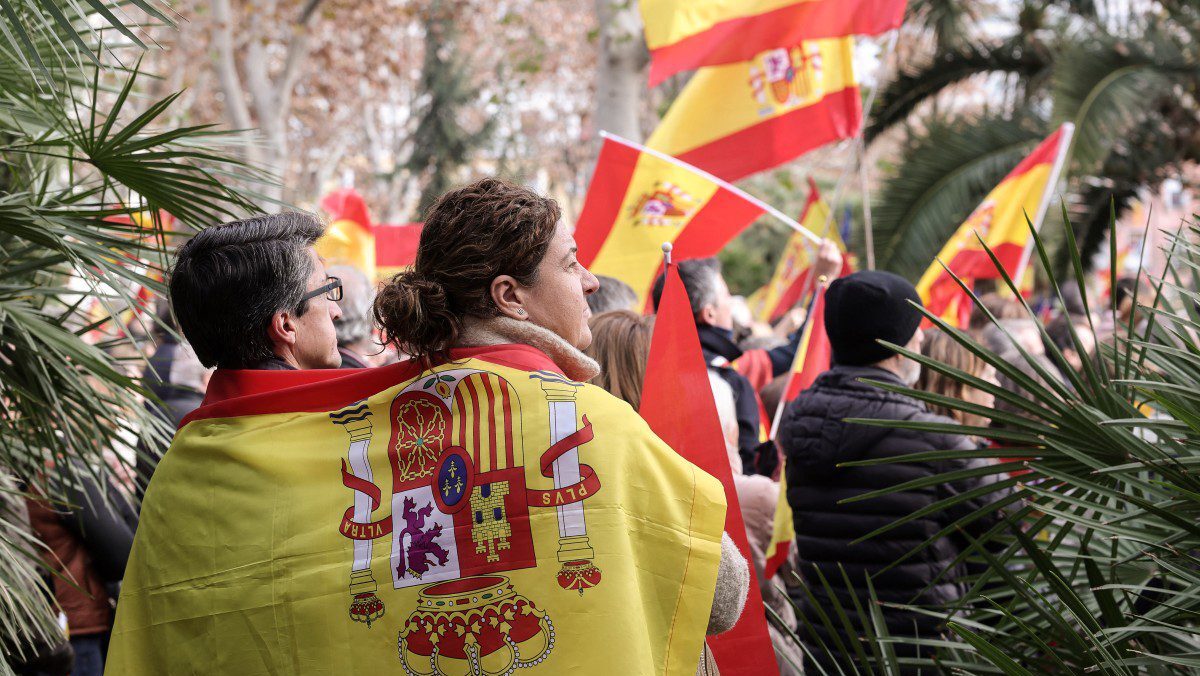
Protestors wave Spanish national flag as they take part in a demonstration against the government’s amnesty bill in Madrid on December 3, 2023.
Photo: Thomas COEX / AFP
The European Parliament has approved as admissible a citizens’ request to review Spain’s proposed amnesty law for Catalan separatists as possibly violating EU treaties, El Debate reports.
The petition, submitted by Rosa Díez, a Spanish former Socialist MP, specifically asks the EU parliament to find out whether the amnesty law complies with articles 2 and 19 of the Treaty on the European Union, as well as with the jurisprudence of the Court of Justice of the European Union. Article 2 outlines “European values” including democracy and the rule of law. Article 19 details what the rule of law means in the treaty.
Claims of ‘rule of law’ violations have most recently been used by Brussels to punish conservative governments like Poland and Hungary. The European Commission withheld €22 billion of EU cohesion funds from Hungary unless it caved to demands on judicial and other reforms that would bring the country in line with liberal ‘values,’ while the European Court of Justice regularly attacked Poland’s former conservative government on similar grounds.
Diez has posted the petition on a website, in which she accuses Spain’s Prime Minister Pedro Sánchez of granting “Impunity in exchange of votes.”
The President of the Spanish Socialist Workers Party (PSOE), Mr. Pedro Sánchez, has recently signed an immoral agreement with the ultra-nationalist party Junts per Catalunya. With this agreement, negotiated in dark rooms outside the country and far from the view of the people,” the petition states “Mr. Sánchez has bought 7 votes in exchange for impunity, granting a political amnesty for those who promoted and carried out the 2017 illegal referendum of independence in Catalonia. Politicians granting impunity to other politicians in exchange of votes!
Dolors Montserrat, a Spanish MEP with the centrist European People’s Party and president of the Petitions Committee of the European Parliament, informed Rosa Díez on Tuesday that the petition had been approved as admissible. Díez, submitted the petition in the name of a number of civic organizations, including the conservative think tank NEOS. She is a former member of Spain’s ruling Socialist Party before leaving in 2007 to form her own socialist-liberal party which shut down in 2020.
“I am pleased to report that the Petitions Committee has examined your petition and has declared it admissible, since the issue you raise falls within the areas of activity of the European Union,” Montserrat said in the statement.
The situation pits Spanish Socialist against Spanish Socialist, as Montserrat has also forwarded her request to the Parliament’s Committee on Civil Liberties, Justice and Home Affairs, chaired, in this case, by Juan Fernando López Aguila. He has been critical of those who are trying to fight the amnesty through the EU’s institutions. However, the Commission has requested more details from Spain’s Socialist government and warned that it is following the situation closely.
Díez also asked that the petition be transferred to other committees such as the Legal Affairs Committee and the Civil Liberties, Justice and Home Affairs Committee, with the purpose of initiating other simultaneous actions if they are considered relevant. Montserrat has confirmed that this has been done.
At the moment, the deadlines of the Petitions Commission are unknown but it is a new step by the Spanish constitutionalists to hold Pedro Sánchez to account.
Sánchez is trying to push the amnesty through Spain’s parliament to appease the Catalan separatist parties that he relies on to prop up his government. The bill would pardon anyone involved in the illegal 2017 referendum on Catalonia’s independence.
Parliamentary committees regularly carry out inquiries into specific issues in a country at the request of citizens. In the last year, delegations from the parliament have visited Spain at least twice. One delegation investigated women’s rights and equality in light of the infamous sexual violence law passed last year that allowed for the early release from prison of hundreds of rapists.
Another delegation examined the use of Spanish in public schools in Catalonia and whether the schools complied with Spanish law or if they were forced to use Catalan.
The delegations provide reports of their findings and recommendations but no binding measures in themselves, though they can serve to highlight issues and provide information.
